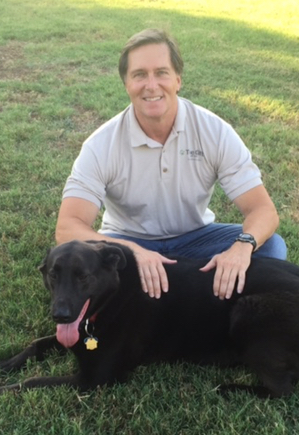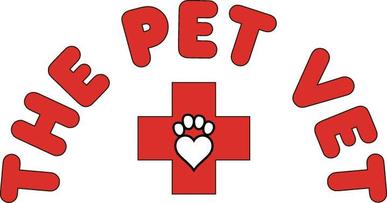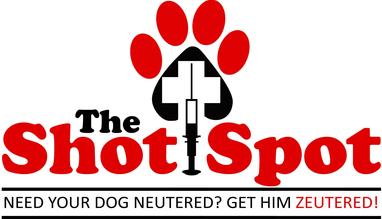The Truth about Spaying And Neutering Your Pet
Lauriston Crockett III
CEO & Founder of Genostim® Performance Labs (GPL)

Lauriston Crockett III (and Max)
www.genostimperformancelabs.com
The Gift For Life® is an “Exclusive” all natural pet product line designed for Cellular Rejuvenation, Vitality and Longevity. The Gift For Life® offers numerous supportive properties for all pets young and old, spayed or neutered. It works directly with your pets adrenal cortex to support their life-giving hormones. It is formulated to address the issues causing our pets to become less active and age poorly. The Gift For Life® is fast acting and very effective. Many owners will see a difference within days.
I have devoted my life to the promotion and implementation of natural health and fitness in human life and in the lives of our pets. As a strong advocate against the toxic side effects of synthetic vitamins and minerals, I have created a paradigm shift in the dietary supplement world utilizing Hexatide Peptide formulas, exclusive only to Genostim® Performance Labs companies: The Gift For Life®, HNS21®, and Genostim®.
These ingestible Peptides are designed to create maximum results in the rejuvenation and longevity in both humans and pets. Awakening the natural endocrine system for hormonal support, the “life force” of the body is brought back into balance using all-natural methods, making The Gift For Life® a game changer that far precedes any other supplement ever produced.
Please feel free to reach out to me if you have any questions. I stand behind all our products and offer a 100% satisfaction and money back guarantee. Thank you again for visiting The Gift For Life®.

Dr. Danny Cox on The Gift For Life®
My name is Dr. Danny R. Cox. I am a Veterinarian in Frisco, Texas and have owned and operated several small animal veterinary hospitals in the North Dallas area for over 34 years. I currently have The Pet Vet, a full service hospital, open 7 days per week, located in Frisco and The Shot Spot mobile wellness clinics that travel to several North Texas locations every week Thursday thru Sunday. Our practices include traditional medicine and surgical procedures as well as new cutting edge treatment modalities for common pet health conditions.
I have recently endorsed The Gift For Life products for both my dog and cat patients and recommend it on a daily basis for many of my patients. These products are especially effective in slowing down common aging effects such as joint disease, skin and hair coat issues, wound healing and cellular destruction, immune issues and bone disease in our patients.
I first became interested in The Gift For Life as it’s benefits relate to a common concern we have regarding pets who have been spayed and neutered. It is a well documented fact that pets who have been surgically altered via traditional castration and ovariohysterectomy show higher incidences of bone cancers, vascular cancers, prostate cancer and disease, joint injuries and disease, obesity, skin and hair coat issues, chronic infections, diabetes and many other endocrine related diseases seen as pets age.
As a result of this scientifically proven evidence, over 4 years ago I began a program of non-surgical neutering male dogs using a naturally occurring Zinc solution called Zeuterin to sterilize male dogs and leave 50 % of their functioning endocrine (testosterone producing testicular cells) system intact. Studies have shown that this procedure works to help control these previously mentioned conditions and it is virtually pain free, safer with no anesthetic risk, no down time and less expensive than traditional castration.
At the same time, we began to offer ovary-sparing spays to combat the same negative consequences of traditional spays (ovariohysterectomy) as well. As a result of our commitment to the long term health benefits of these procedures to our patients, we feel we are making a gigantic difference in the longevity and quality of life for these patients using scientific evidence to support our program at The Pet Vet and The Shot Spot while combating the serious pet overpopulation issues throughout our country.
Therefore, with the realization that in many cases along with the difficulty to change pet owner’s attitudes as well as those of many Veterinarians toward the negativity of traditional pet neutering and spaying, we needed a product to offer the those who are showing up a little late to the dance! This is where The Gift For Life steps up to the plate and offers an opportunity for these patients to experience a longer life with healthier benefits of a naturally stimulated and homeostatic endocrine system that we unfortunately altered with surgical manipulation.
Yes, these products and procedures provide a pathway to a healthier, longer and more productive quality of life!
Please visit my websites at www.thepetvet.com and www.theshotspot.org. The Gift For Life products and the procedures described above are available on The Shot Spot trucks and at The Pet Vet Hospital.
Dr. Karen Becker, a proactive and integrative wellness veterinarian, discusses all about neutering or spaying in pets and the hormonal imbalance she was seeing in her practice.
Dr. Jenifer Preston on the negative health effects of spaying and neutering your pets and how The Gift For Life® helps.
Most pet owners are not aware that there are potential and dangerous health effects to neutering or spaying their pets. I am not recommending that the surgeries not be done. On the contrary, I recommend to my clients that they do neuter their beloved pets. I also make them aware of consequences later on in the life of that pet and how to fill the gap in the health of their dogs.
First and foremost, there are several kinds of cancers that neutered animals are more prone to get. Unfortunately, it is because of the lack of hormones that they are susceptible to these serious tumors. For instance, neutering or spaying increases, the risk of a deadly cancer called hemangiosarcoma, which typically attacks the heart or spleen. Apparently the reproductive hormones offer some protection against this particular cancer, because neutered males or spayed females are twice as likely to develop hemangiosarcoma of the spleen and 5 times as likely to develop hemangiosarcoma of the heart than un-neutered pets.
Secondly, there is a lack of stamina and muscular development in the altered canines compared to intact canines. This also leads to to hip dysplasia and ligament tears etc.
Luckily, there is a solution to this problem. The adrenal gland does manufacture and secrete hormones under the right conditions. These tiny glands, situated at the top of the kidneys, exert a huge influence on your dog’s health and well being.
One type of hormone originating from the adrenal cortex are the adrenal sex hormones. Secreted in relatively small amounts by the zona reticular is (inner zone of the adrenal cortex), these include progesterone, estrogens, and androgens. The effect of the adrenal sex hormones is usually masked by the hormones from the testes and ovaries, but scientists have found that this adrenal activity takes on more significance in the spayed or neutered animal. After the spaying or neutering, this activity is greatly suppressed. Not only does The Gift For Life® stimulate cellular rejuvenation and increased vitality and longevity for all breeds as it acts on a molecular level, but is the one product that can rebalance adrenal function and trigger production of these adrenal hormones in the neutered animal. The Gift For Life®. Isotide™ Peptide Complex contains 18 short amino acid chains that stimulate natural growth factors and further stimulate the adrenal glands, normalizing their function. Other than the brain, the most important target organs are the adrenal glands because of the vital hormones they produce.
I cannot over emphasize enough the significance of these peptides that are included in The Gift For Life®. I think they address the problems that arise from altering out dogs at any age.

Click HERE to read about the UofC, Davis Golden Retriever Study On Neutering Affecting Dogs Health
Neutering, and the age at which a dog is neutered, may affect the animal’s risk for developing certain cancers and joint diseases, according to a study of golden retrievers by a team of researchers at the University of California, Davis.
The study, which examined the health records of 759 golden retrievers, found a surprising doubling of hip dysplasia among male dogs neutered before one year of age. This and other results was published (Feb. 13 2013) in the online scientific journal PLOS ONE.
“The study results indicate that dog owners and service-dog trainers should carefully consider when to have their male or female dogs neutered,” said lead investigator Benjamin Hart, a distinguished professor emeritus in the UC Davis School of Veterinary Medicine.
“It is important to remember, however, that because different dog breeds have different vulnerabilities to various diseases, the effects of early and late neutering also may vary from breed to breed,” he said.
While results of the new study are revealing, Hart said the relationship between neutering and disease-risk remains a complex issue. For example, the increased incidence of joint diseases among early-neutered dogs is likely a combination of the effect of neutering on the young dog’s growth plates as well as the increase in weight on the joints that is commonly seen in neutered dogs.
Dog owners in the United States are overwhelmingly choosing to neuter their dogs, in large part to prevent pet overpopulation or avoid unwanted behaviors. In the U.S., surgical neutering — known as spaying in females — is usually done when the dog is less than one year old.
In Europe, however, neutering is generally avoided by owners and trainers and not promoted by animal health authorities, Hart said. During the past decade, some studies have indicated that neutering can have several adverse health effects for certain dog breeds. Those studies examined individual diseases using data drawn from one breed or pooled from several breeds.
Against that backdrop, Hart and colleagues launched their study, using a single hospital database. The study was designed to examine the effects of neutering on the risks of several diseases in the same breed, distinguishing between males and females and between early or late neutering and non-neutering.
The researchers chose to focus on the golden retriever because it is one of the most popular breeds in the U.S. and Europe and is vulnerable to various cancers and joint disorders. The breed also is favored for work as a service dog.
The research team reviewed the records of female and male golden retrievers, ranging in age from 1 to 8 years, that had been examined at UC Davis’ William R. Pritchard Veterinary Medical Teaching Hospital for two joint disorders and three cancers: hip dysplasia, cranial cruciate ligament tear, lymphosarcoma, hemangiosarcoma and mast cell tumor. The dogs were classified as intact (not neutered), neutered early (before 12 months age), or neutered late (at or after 12 months age).
Joint disorders and cancers are of particular interest because neutering removes the male dog’s testes and the female’s ovaries, interrupting production of certain hormones that play key roles in important body processes such as closure of bone growth plates, and regulation of the estrous cycle in female dogs.
The study revealed that, for all five diseases analyzed, the disease rates were significantly higher in both males and females that were neutered either early or late compared with intact (non-neutered) dogs Specifically, early neutering was associated with an increase in the occurrence of hip dysplasia, cranial cruciate ligament tear and lymphosarcoma in males and of cranial cruciate ligament tear in females. Late neutering was associated with the subsequent occurrence of mast cell tumors and hemangiosarcoma in females.
In most areas, the findings of this study were consistent with earlier studies, suggesting similar increases in disease risks. The new study, however, was the first to specifically report an increased risk of late neutering for mast cell tumors and hemangiosarcoma.
Furthermore, the new study showed a surprising 100 percent increase, or doubling, of the incidence of hip dysplasia among early-neutered males. Earlier studies had reported a 17 percent increase among all neutered dogs compared to all non-neutered dogs, indicating the importance of the new study in making gender and age-of-neutering comparisons.
Other researchers on this UC Davis study were: Gretel Torres de la Riva, Thomas Farver and Lynette Hart, School of Veterinary Medicine; Anita Oberbauer, Department of Animal Science; Locksley Messam, Department of Public Health Sciences; and Neil Willits, Department of Statistics.
Media contact(s):
- Benjamin Hart, School of Veterinary Medicine, (530) 752-1555, blhart@ucdavis.edu
- Pat Bailey, UC Davis News Service, (530) 752-9843, pjbailey@ucdavis.edu
If you have questions on our products, would like to submit your pets story to us or are interested in product distribution, please call or email us.
(877) 324-0535
info@thegiftforlife.com





